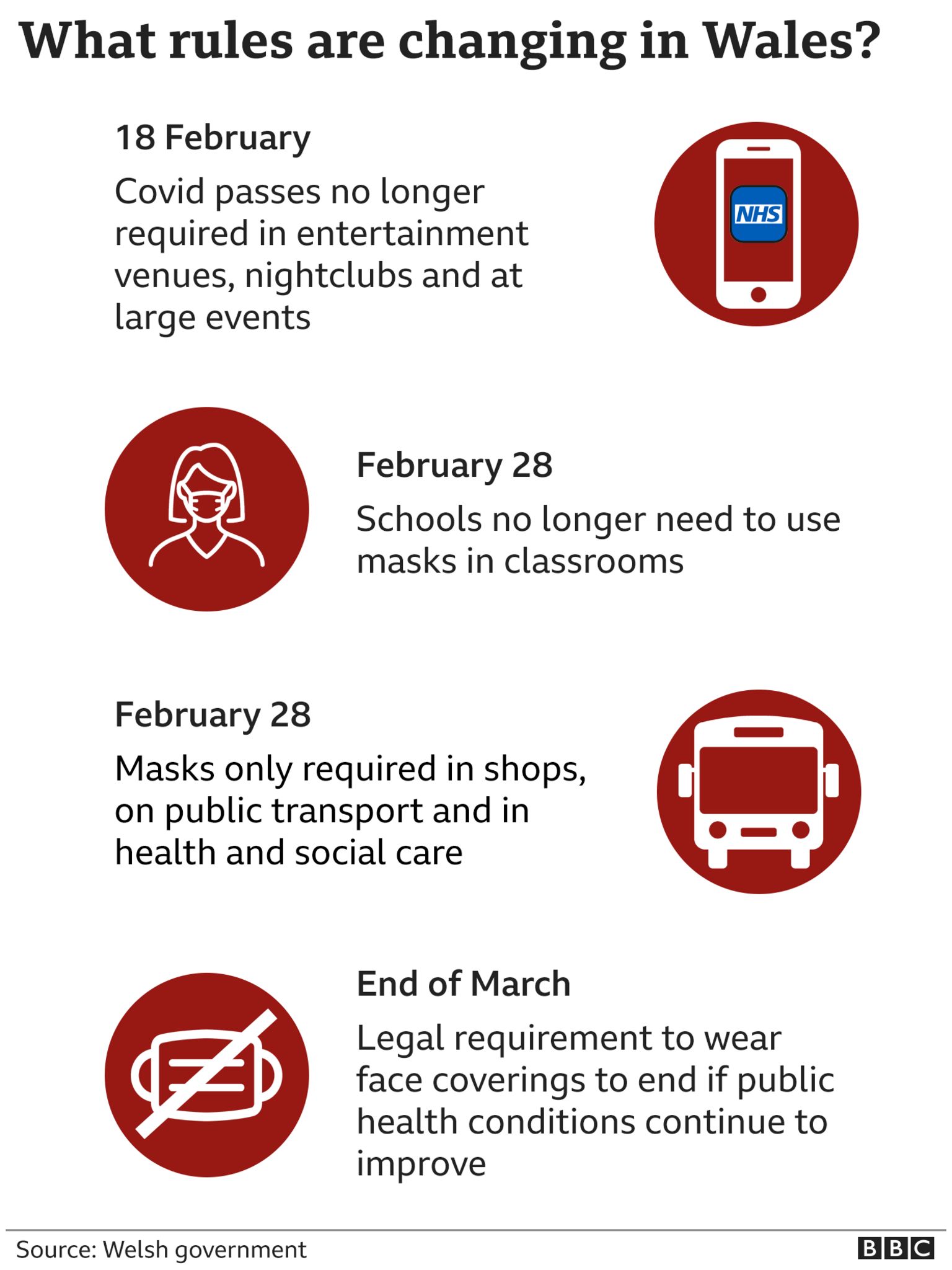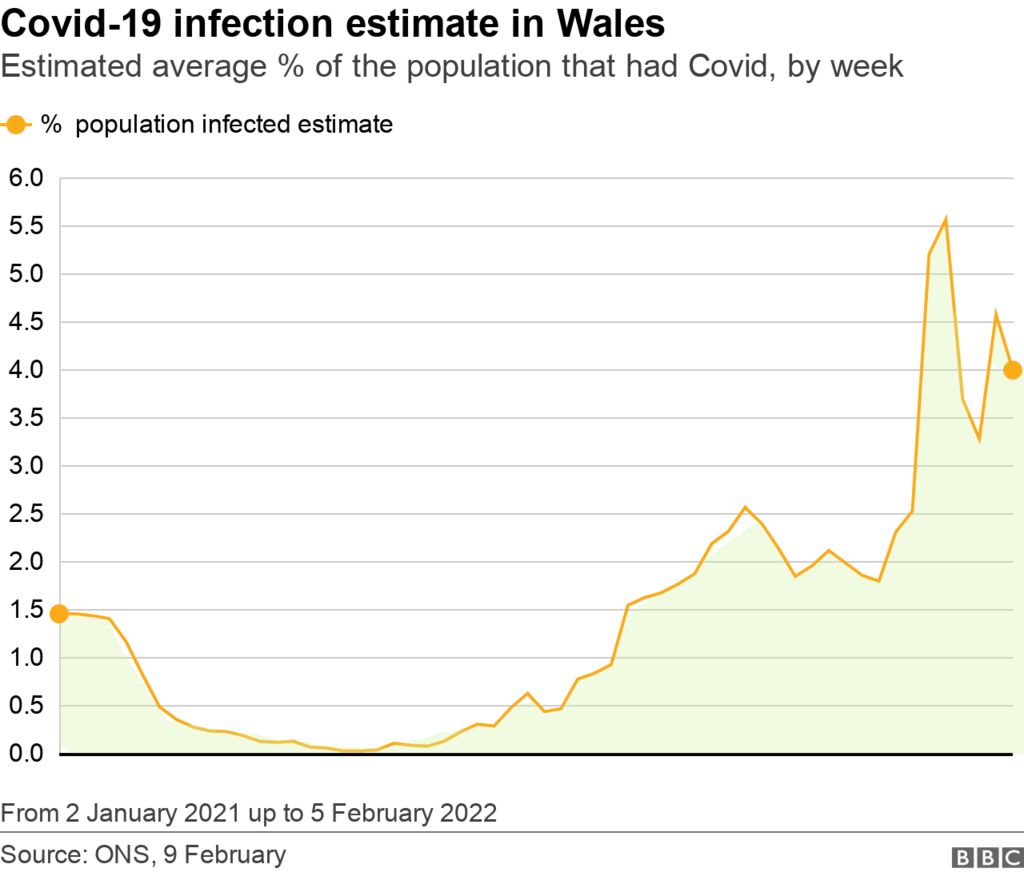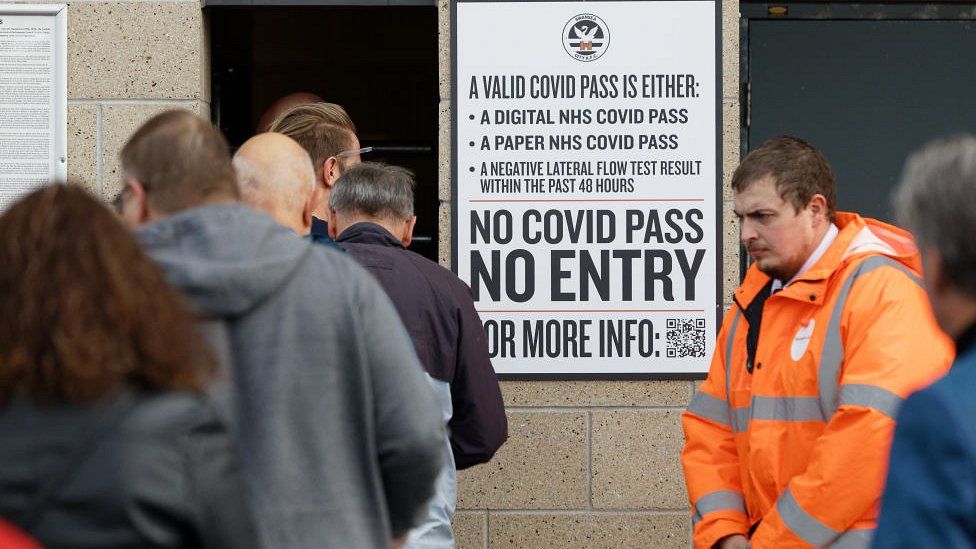Wales remaining Covid laws – including on face coverings and self-isolation – could be scrapped by the end of March.
The Welsh government says falling case rates mean it can begin to ease its remaining rules – with domestic Covid pass rules axed from 18 February.
Economy Minister Vaughan Gething said self-isolation rules could change from being legally enforceable to guidance.
But the law will remain for now – despite UK government proposals to ease the restriction in England this month.
Meanwhile rules on masks will be eased from 28 February so they are only required in shops, including salons and hairdressers, public transport and health and social care, rather than venues such as museums or cinemas.
Also, pupils will not have to wear masks in class from the same date – schools can then decide their rules.
Covid passes will no longer be legally required from next Friday in cinemas, theatres, clubs and large events.
They will still apply until then, including for Wales v Scotland in the Six Nations on Saturday.
The Welsh Conservatives called for a date for the removal of all Covid laws, while Plaid Cymru said Labour ministers should spell out what criteria must be met for the restrictions to be lifted.
Although there is no precise timetable, it is the first time the Welsh government has set out how laws brought in to tackle the pandemic could be completely lifted.
Economy Minister Vaughan Gething told BBC News the remaining restrictions may be removed at the end of March.
“At that point we may move to self-isolation being guidance rather than mandatory but at this point we think it is still important to have that as a protective measure in law,” he said.
A further Covid review is due by 3 March, when ministers are likely to announce what they will do with the remaining rules.
Separately, from 11 February guidance will be updated to clarify that adults can remove their face coverings when interacting with babies and small children at baby and toddler groups.


England scrapping self-isolation ‘unusual’
Mr Gething is leading Friday’s press conference on the latest Welsh government review because first minister Mark Drakeford is self-isolating after he tested positive for Covid.
Speaking on Sky News, Mr Gething said Welsh Labour leader was “fine all things being considered”, and was able to work “through most of yesterday”.
In England Boris Johnson said that self-isolation rules could end by 21 February.
Mr Gething said this was a “highly unusual” move by the Prime Minister which had not been discussed between the Welsh government’s and the UK government’s chief medical officers.
He added: “There’d been no advice from SAGE, no joint recommendation or discussion between chief medical officers saying that this was the right thing to do, no scientific advice provided, no meeting between health ministers in advance.”
He was asked what would happen to someone who had Covid who lived in England but came to work in Wales without self-isolating, Mr Gething said that person would be “in breach of the law”.
“If you are in Wales, you need to follow the rules in Wales, it’s that simple,” he said.
Mr Drakeford said his government was “confident that coronavirus rates are falling and we can look forward to brighter times ahead”.
But he said he would not remove all measures at once “because the pandemic is not over yet”.
‘There should be a new normal’
 IMAGE SOURCE,LEANDRA CRAINE
IMAGE SOURCE,LEANDRA CRAINELeandra Craine, 23, who works for Disability Wales, said she was worried too many restrictions were being eased at once.
“I especially think of friends and family members who are immuno-supressed and have been having to shield for two years,” she added.
“My main concern is that being too quick could really destroy the work we’ve done so far over the last two years so far.
“We’re just lucky enough to benefit from vaccines, for example, and we’re more protected… I don’t think we should go back to normal as was, as I don’t think it was working too well.
“I think there should be a new normal.”
The Welsh Beer and Pub Association has welcomed the changes.
Chief executive of the Welsh Beer and Pub Association, Emma McClarkin told BBC Radio Wales: “It’s going to take a lot longer in the lifting of restrictions to remove the impact of Covid.
“In Wales it has been hitting businesses much deeper and will take much longer to recover in Wales. We are desperately needing to get back on track and helping build that confidence with our customers as we move forward.”

Wales’ Covid rate was 412 per 100,000 people on Thursday and is substantially down from the height of the Omicron wave.
The Office for National Statistics infection study also suggested that the percentage of people testing positive for Covid decreased in the week ending 5 February.
Opposition politicians called for the Welsh government to spell out the way forward.
Andrew RT Davies, Welsh Conservative Senedd leader, said: “Thanks to the excellent vaccination programme and everyone’s hard work, the trend of infections, hospitalisations and deaths is downwards, a positive progression that shows the diminishing threat of the pandemic.
“Given these positive developments and the success of the vaccination campaign, this must mean that our freedoms in Wales are returned in full without delay.”
Plaid Cymru’s health spokesman Rhun ap Iorwerth urged the Welsh government to “keep things steady in the very real hope that we won’t need to take a step back to any further restrictions in the future”.
He added: “In the meantime, the Welsh government must set out the steps for what criteria must be met for all restrictions to be lifted in Wales.”
 IMAGE SOURCE,GETTY IMAGES
IMAGE SOURCE,GETTY IMAGESLaws requiring the wearing of masks in indoor spaces were introduced in Wales in September 2020.
The UK government lifted mask requirements last summer, before briefly reintroducing them for the Omicron wave at the end of 2021.
Covid passes were introduced last autumn following a farcical Senedd vote where the opposition failed to stop the government measure from passing after a single Tory, away at party conference, did not vote remotely.
That was despite opposition from the Conservatives, Welsh Liberal Democrat Jane Dodds and – at the time of the vote – Plaid Cymru – exactly half of the Welsh Parliament and enough to block legislation from becoming law.
Under the Welsh government’s alert level zero laws, only a few Covid restrictions are left after most of the restrictions put in place due to the Omicron variant were removed in January.
Other rules remaining include a requirement on businesses to have coronavirus risk assessments.


